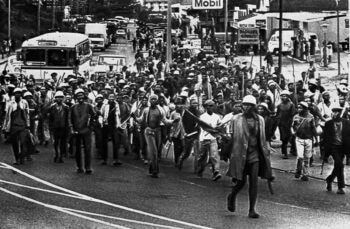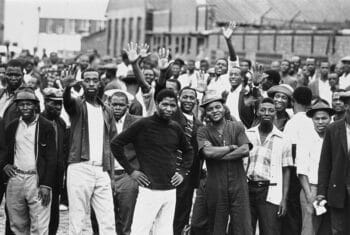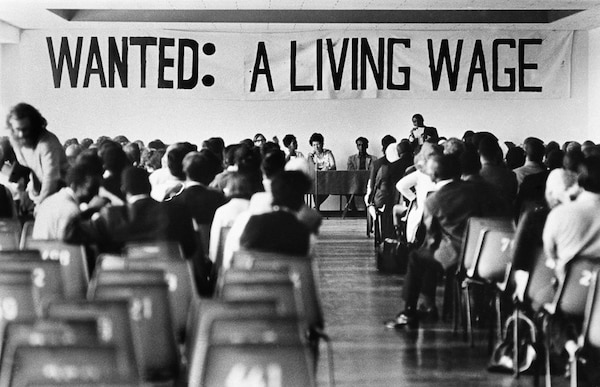Dear friends,
Greetings from the desk of Tricontinental: Institute for Social Research.
Democracy has a dream-like character. It sweeps into the world, carried forward by an immense desire by humans to overcome the barriers of indignity and social suffering. When confronted by hunger or the death of their children, earlier communities might have reflexively blamed nature or divinity, and indeed those explanations remain with us today. But the ability of human beings to generate massive surpluses through social production, alongside the cruelty of the capitalist class to deny the vast majority of humankind access to that surplus, generates new kinds of ideas and new frustrations. This frustration, spurred by the awareness of plenty amidst a reality of deprivation, is the source of many movements for democracy.
Habits of colonial thought mislead many to assume that democracy originated in Europe, either in ancient Greece (which gives us the word ‘democracy’ from demos, ‘the people’, and kratos, ‘rule’) or through the emergence of a rights tradition, from the English Petition of Right in 1628 to the French Declaration of the Rights of Man and of the Citizen in 1789. But this is partly a retrospective fantasy of colonial Europe, which appropriated ancient Greece for itself, ignoring its strong connections to North Africa and the Middle East, and used its power to inflict intellectual inferiority on large parts of the world. In doing so, colonial Europe denied these important contributions to the history of democratic change. People’s often forgotten struggles to establish basic dignity against despicable hierarchies are as much the authors of democracy as those who preserved their aspirations in written texts still celebrated in our time.

Coronation Brick workers march along North Coast Road in Durban, led by a worker waving a red flag.
(Credit: David Hemson Collection, University of Cape Town Libraries)
Over the course of the second half of the twentieth century, a range of struggles developed against dictatorial regimes in the Third World that had been put in place by anti-communist oligarchies and their allies in the West. These regimes were born out of coups (such as in Brazil, the Philippines, and Turkey) and given the latitude to maintain legal hierarchies (such as in South Africa). The large mass demonstrations that laid at the heart of these struggles were built up through a range of political forces, including trade unions—a side of history that is often ignored. The growing trade union movement in Turkey was, in fact, part of the reason for the military coups of 1971 and 1980. Knowing that their hold on power was vulnerable to working-class struggles, both military governments banned unions and strikes. This threat to their power had been evidenced, in particular, by a range of strikes across Anatolia developed by unions linked to the Confederation of Progressive Trade Unions (DISK), including a massive two-day demonstration in İstanbul known as the June 15—16 Events that drew in 100,000 workers. The confederation, established in February 1967, was more militant than the existing one (Türk İş), which had become a collaborator with capital. Not only did militaries move against socialist and non-socialist governments alike that attempted to exercise sovereignty and improve the dignity of their peoples (such as in the Congo in 1961, Brazil in 1964, Indonesia in 1965, Ghana in 1966, and Chile in 1973), but they also moved out of the barracks—with the bright green light from Washington—to quell the cycle of strikes and worker protests.

A group of striking textile workers demand an extra R5 per day at the Consolidated Textile Mill in February 1973. (Credit: David Hemson Collection, University of Cape Town Libraries)
Once in power, these wretched regimes, dressed in their khaki uniforms and the finest silk suits, drove austerity policies and cracked down on any movements of the working class and peasantry. But they could not break the human spirit. In much of the world (as in Brazil, the Philippines, and South Africa), it was trade unions that fired the early shot against barbarism. The cry in the Philippines ‘Tama Na! Sobra Na! Welga Na!’ (‘We’ve had enough! Things have gone too far! It’s time to strike!’) moved from La Tondeña distillery workers in 1975 to protests in the streets against Ferdinand Marcos’ dictatorship, eventually culminating in the People Power Revolution of 1986. In Brazil, industrial workers paralysed the country through actions in Santo André, São Bernardo do Campo, and São Caetano do Sul (industrial towns in greater São Paulo) from 1978 to 1981, led by Luiz Inácio Lula da Silva (now Brazil’s president). These actions inspired the country’s workers and peasants, raising their confidence to resist the military junta, which collapsed as a result in 1985.
Fifty years ago, in January 1973, the workers of Durban, South Africa, struck for a pay rise, but also for their dignity. They woke at 3 am on 9 January and marched to a football stadium, where they chanted ‘Ufil’ umuntu, ufile usadikiza, wamthint’ esweni, esweni usadikiza’ (‘A person is dead, but their spirit lives; if you poke the iris of their eye, they still come alive’). These workers led the way against entrenched forms of domination that not only exploited them, but also oppressed the people as a whole. They stood up against harsh labour conditions and reminded South Africa’s apartheid government that they would not sit down again until class lines and colour lines were broken. The strikes opened a new period of urban militancy that soon moved off the factory floors and into wider society. A year later, Sam Mhlongo, a medical doctor who had been imprisoned on Robben Island as a teenager, observed that ‘this strike, although settled, had a detonator effect’. The baton was passed to the children of Soweto in 1976.
 From Tricontinental: Institute for Social Research and the Chris Hani Institute comes a memorable text, The 1973 Durban Strikes: Building Popular Democratic Power in South Africa (dossier no. 60, January 2023). It is memorable in two senses: it recovers an almost lost history of the role of the working class in the fight against apartheid, in particular the Black working class, whose struggle had a ‘detonator’ effect on society. The dossier, beautifully written by our colleagues in Johannesburg, makes it hard to forget these workers and harder still to forget that the working class—still so deeply marginalised in South Africa—deserves respect and a greater share of the country’s social wealth. They broke the back of apartheid but did not benefit from their own sacrifices.
From Tricontinental: Institute for Social Research and the Chris Hani Institute comes a memorable text, The 1973 Durban Strikes: Building Popular Democratic Power in South Africa (dossier no. 60, January 2023). It is memorable in two senses: it recovers an almost lost history of the role of the working class in the fight against apartheid, in particular the Black working class, whose struggle had a ‘detonator’ effect on society. The dossier, beautifully written by our colleagues in Johannesburg, makes it hard to forget these workers and harder still to forget that the working class—still so deeply marginalised in South Africa—deserves respect and a greater share of the country’s social wealth. They broke the back of apartheid but did not benefit from their own sacrifices.
The Chris Hani Institute was founded in 2003 by the South African Communist Party and the Congress of South African Trade Unions. Chris Hani (1942—1993) was one of South Africa’s great freedom fighters, a communist who would have made an even greater impact than he did had he not been assassinated at the end of apartheid. We are grateful to Dr Sithembiso Bhengu, the director of the Chris Hani Institute, for this collaboration and look forward to the work that lies before us.
As this dossier went to press, we heard that our friend Thulani Maseko (1970—2023), chairperson of the Multi-Stakeholders Forum in Swaziland, was shot dead in front of his family on 21 January. He was one of the leaders of the fight to bring democracy to his country, where workers are at the forefront of the battle to end the monarchy.
When I reread our latest dossier, The 1973 Durban Strikes, to prepare for this newsletter, I was listening to Hugh Masekela’s ‘Stimela’ (‘Coal Train’), the 1974 song of migrant workers travelling on the coal train to work ‘deep, deep, deep down in the belly of the earth’ to bring up wealth for apartheid capital. I thought of the Durban industrial workers with the sound of Masekela’s train whistle in my ear, remembering Mongane Wally Serote’s long poem, Third World Express, a tribute to the workers of southern Africa and their struggles to establish a humane society.
— it is that wind
it is that voice buzzing
it is whispering and whistling in the wires
miles upon miles upon miles
on the wires in the wind
in the subway track
in the rolling road
in the not silent bush
it is the voice of the noise
here it comes
the Third World Express
they must say, here we go again.
‘Here we go again’, Serote wrote, as if to say that new contradictions produce new moments for struggle. The end of one crushing order—apartheid—did not end the class struggle, which has only deepened as South Africa is propelled through crisis upon crisis. It was the workers who brought us this democracy, and it will be workers who will fight to establish a deeper democracy yet. Here we go again.
Warmly,
Vijay

